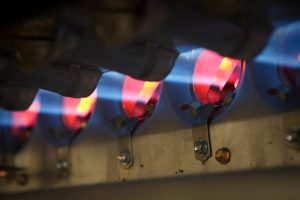If you’ve noticed your furnace making a loud boom or bang noise when it kicks on, you might be dealing with delayed ignition. This issue is more than just a nuisance—it could be a sign that your furnace needs professional furnace repair in Sandersville, GA.
What causes this delayed ignition? We’re going to explain the basics of this problem, the causes behind it, and why you need to only rust professionals if you need your furnace repaired.
What Is Delayed Furnace Ignition?
Delayed ignition occurs when gas builds up inside the furnace but doesn’t ignite immediately when the burners turn on. Normally, when a gas furnace starts, the burners ignite right away to create a steady flame. However, when ignition is delayed, the gas lingers for a few extra seconds. Once the gas finally ignites, the sudden combustion can produce a loud boom, which is the sound many homeowners notice.
While the occasional noise may not seem urgent, delayed ignition can lead to serious problems over time. This situation puts added stress on your furnace components and can even cause damage to the heat exchanger or other critical parts. More importantly, it introduces safety concerns, including the risk of a gas leak or fire hazard if left unchecked.
Common Causes of Delayed Ignition
Dirty Burners
Over time, dirt, dust, and debris can accumulate on the furnace burners, preventing gas from flowing properly. This buildup makes it harder for the burners to ignite on time, allowing gas to collect before ignition occurs.
Blocked or Restricted Airflow
If the furnace isn’t getting enough air, the ignition process can be interrupted. Airflow problems often stem from a clogged air filter, blocked vents, or issues with the furnace blower.
Faulty Igniter or Pilot Light Issues
In older furnaces, the pilot light might not stay lit, or the flame sensor may malfunction. Newer furnaces often use electronic igniters, which can wear out over time or develop electrical issues that delay ignition.
Low Gas Pressure
If there’s not enough gas reaching the furnace burners, ignition may be delayed. This could be due to problems with the gas supply line or the gas valve inside the furnace.
Corroded Flame Sensor
The flame sensor detects whether the burners are lit and helps regulate the ignition process. If the sensor becomes dirty or corroded, the furnace might struggle to ignite properly, leading to delays.
Don’t Attempt DIY Repairs
You might feel tempted to troubleshoot a furnace issue on your own—but please don’t! Working on a gas furnace without proper training is dangerous. Attempting a DIY repair could lead to:
- Gas leaks: Mishandling the gas line could cause a leak, creating a serious safety hazard.
- Fire risks: Incorrect repairs might cause delayed ignition to worsen or lead to additional malfunctions.
- Carbon monoxide exposure: An improperly repaired furnace may release this odorless and dangerous gas into your home.
It’s always best to contact licensed HVAC professionals. At Premier Heating & Air, we have the tools and experience to diagnose and fix delayed ignition safely and efficiently.


